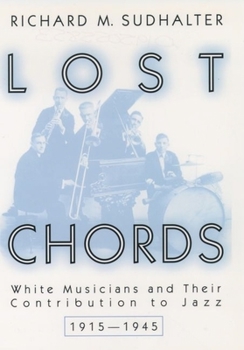Lost Chords: White Musicians and Their Contribution to Jazz
Select Format
Select Condition 
Book Overview
Many jazz fans and critics--and even some jazz musicians--contend that white players have contributed little of substance to the music; that even, with every white musician removed from the canon, the history and nature of jazz would remain unchanged. Now, with Lost Chords, musician-historian Richard M. Sudhalter challenges this narrow view, with a book that pays definitive tribute to a generation of white jazz players, many unjustly forgotten--while...
Format:Hardcover
Language:English
ISBN:0195055853
ISBN13:9780195055856
Release Date:February 1999
Publisher:Oxford University Press, USA
Length:912 Pages
Weight:3.20 lbs.
Dimensions:2.4" x 6.5" x 9.3"
Customer Reviews
4 ratings
Just the facts
Published by Thriftbooks.com User , 21 years ago
While a brilliant documentary, Burns' "Jazz" also reinforced the notion that jazz is exclusively an African-American artform. Fortunately, "Lost Chords" does much to blow away that misperception. While never belittling or downplaying the role of those African-American giants in jazz, this book does an outstanding job of profiling all of the individuals and bands who received short shrift from Burns: Steve Brown, who pretty much invented jazz bass playing; the Jean Goldkette Orchestra; Miff Mole; Frank Trumbauer; and may more. And he does so in a way that is both interesting to the casual fan (with anecdotes and such) and the hardened muso (excerpts of scores abound). A scholarly tome, this is a worthy addition for any jazz fan's library. I look forward to Volume II.
Lost Chords comments
Published by Thriftbooks.com User , 24 years ago
A wonderful trip thru what must have been an incredible period to be an active jazz fan. Thank you Jeff Ellis for your accomplishments. The nine years you have invested are proven by this book to be extraordinarily justified.Readers should be aware there is a companion CD of selected samples of the jazz discussed in this book which should also be ordered.
Fascinating, Readable, Essential, and Anti-Racist
Published by Thriftbooks.com User , 25 years ago
This is a monster. It's monsterously large, monsterously interesting, and monsterously important. But like most monsters, it can easily be misunderstood. As Mr. Givens, writing just before me has so well expressed, it corrects the sophmoric notion that early jazz was a solely American Black movement. Unfortunately, it takes a unique record collection to compliment the text as you take in the rich, marvelously written narrative. I have such a collection (both black and white jazz) and it helped emormously to refer to it every few pages. This made reading this book a multi-media tour through my own record collection as well as a reading pleasure. Too bad that CD Mr. Givens mentions was not included with the book -- I would have made the points he makes that much more accessible to people without the music to refer to.There are many interesting aspects brought up throughout the book. For example, the fact that Sicilians were so important to early jazz, and that white and black jazz, although differing in presentation and performance, evolved together and in relation to one another are two points well and truely made by the book. As a matter of fact the book is so authoritative that I don't think it can't be successfully critiqued by anyone who does not have years of listening under his belt. I myself went through the early jazz journey, starting with the "jazz is black" point of view when I was in college. A sophomore in fact. We now know that even blues had a white/black evolution as well as jazz. It may be that one has to start at the black is everything perspective to get to the right point of view. I consider people who casually hold that point of view as not completing that journey.It is also important to note that the book is beautifully written by someone who commands the language as well as the most accomplished novelist. In any case, Lost Chords is possibly the most important book on jazz written since World War II. I certainly think so.
Excellent commentary on least common side of old debate
Published by Thriftbooks.com User , 25 years ago
Mr.Sudhalter has chosen to place himself in the center of the 82 year old debate over whether jazz is only a black innovation in music. Although at first glance, many will instantly brand the book racist and anti-black, they will find (by actually reading the book) that Mr. Sudhalter is simply stating the case for jazz being both black and white, and he does so extremely well. He cites actual events and circumstances, musical examples, and quotes from the musicians themselves, both white and black. The book relates how musicians respected and admired each other's talent, regardless of race; how the growth and development of jazz was a truly multi-cultural event in our history. Mr. Sudhalter shows no lack of respect for anyone, except those narrow-minded jazz enthusiasts who refuse to consider the whole picture of jazz history. 'Lost Chords' just happens to cover the time frame in jazz that I really enjoy, so I was familiar with most of the musicians and music discussed. For those who aren't, I can recommend it as a way to appreciate where your choice of jazz came from, be it 50's jazz or 90's. And by the last page, you may decide it's time to go buy some of the classic jazz in this book and decide for your yourself. (A companion CD is available, and I highly recommend it to anyone reading this book).





